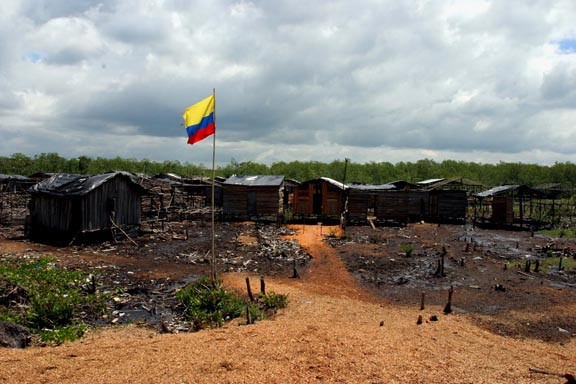
The free trade agreement (FTA) between the US and Colombia, which took effect on May 15, 2012, hadn’t yet reached its second birthday when the office of the public workers’ union in Cali, SINTRAEMCALI, was firebombed. On April 11 a Colombian court had ordered the country’s government to apologize for attacking the union, along with that of the telephone workers, SINTRATELEFONOS, and university workers, SINTRAUNICOL, during the past administration of President Alvaro Uribe, who signed the trade agreement. The bombs were thrown five days later.
In 2004, a large number of SINTRAEMCALI workers were fired, and over the years since 15 were forced to flee Cali, eight were murdered and over 100 more threatened. Last year, a leader of the city union’s retirees’ organization, Luis Fabio Campo Rodriguez, was murdered, and the union’s past president, Alexander Lopez Maya, was revealed as the target of a government assassination program, “Operation Dragon.”
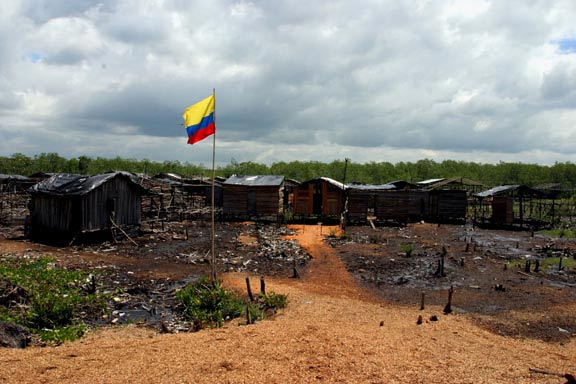 Afro-Colombian families displaced by the expansion of oil palm plantations, and by Colombia’s paramilitary and military groups who protect them, have created a squatter community, the Familias en Accion barrio, at the edge of Tumaco, a coastal city in Nariño department. (Photo: David Bacon)
Afro-Colombian families displaced by the expansion of oil palm plantations, and by Colombia’s paramilitary and military groups who protect them, have created a squatter community, the Familias en Accion barrio, at the edge of Tumaco, a coastal city in Nariño department. (Photo: David Bacon)
On March 14, two months before the FTA’s birthday, 17 leaders of the Association of Peasant Workers of Nariño were arrested in Nariño province. The arrests were widely viewed in Colombia as government retaliation for a strike organized by farmers and students this past August.
Twenty-six Colombian unionists were murdered in 2013, and 73 over the past three years. Among them was Oscar Lopez Triviño, a leader of the union for workers at bottling plants, SINALTRAINAL, in Bugalagrande. Lopez and other leaders had received death threats, and were conducting a hunger strike at the time of his murder on November 9.
His union has been a particular target for murder over the past decade. At the Coca Cola plant in Barranquilla, union leaders William Mendoza and Juan Carlos Galvis have received virtually continual threats, and an attempt was made to kidnap Galvis’ daughter, forcing him to relocate his family to another city. In 2001 and 2006, the United Steelworkers of America and the International Labor Rights Forum filed lawsuits in the US, charging that Coca Cola bottlers in Colombia “contracted with or otherwise directed paramilitary security forces that utilized extreme violence and murdered, tortured and unlawfully detained or otherwise silenced trade union leaders.”
The attacks by Coca Cola haven’t stopped.
The attacks by Coca Cola haven’t stopped. SINALTRAINAL says that the plant in Medellin contracted out the jobs of 100 workers to a front company, Eficacia (“Efficiency”), and other workers were told that if they didn’t resign from the union, their jobs would go to another front company, Atencom. When the subcontracted workers at Eficacia joined the union despite threats, they were fired. Coca Cola managers called in the police, who arrived in “armored tanks,” according to the union, and stayed inside the plant several days. According to the Washington Office on Latin America, “illegal subcontracting and mass firings continue to be widely used to violate the right to free association.”
The murders haven’t stopped. On January 2 of this year, Ever Luis Marin Rolong was getting off a bus at the Aguila brewery, also in Barranquilla, where he’d worked and belonged to his union, SINALTRACEBA, for 26 years. A killer fired six shots at pointblank range, and Rolong died in a police clinic. According to Justice for Colombia, “the following evening the president of SINALTRACEBA, Rafael Maldonado Gamboa, received a death threat over the phone from a man who identified himself as ‘Joaquin.’ The caller said ‘We’ve killed the first of you; you’re the second.'”
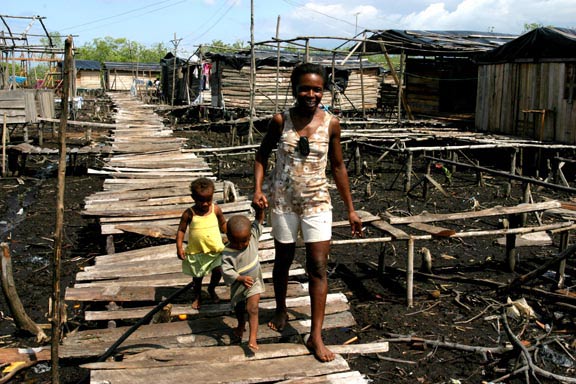
Long ago, the brewery, which belongs to the British company SABMiller, plc, had a strong union. In the long wave of anti-union violence of the past two decades, it was destroyed. But last year, the workers reorganized. They’d just negotiated their first contract with SINALTRACEBA when Marin Rolong was assassinated. “There was a lot of pressure, a lot of tension and a lot of threats. And then we had this killing,” Daniel Hawkins, a researcher at the Escuela Nacional Sindical (National Union School) told the International Business Times.
Colombian unions and farmers opposed the free trade agreement strongly, and today hold it responsible for increasing poverty while fostering a climate in which corporate rights are paramount and labor rights hardly exist.
In the free trade agreement’s first year, Colombian exports to the US fell by 15% while imports from the United States grew by nearly the same amount.
In the free trade agreement’s first year, Colombian exports to the US fell by 15% while imports from the United States grew by nearly the same amount. Tariffs were eliminated for 80% of US manufactured goods imports. While Colombian raw materials exports, mostly agricultural and mining products, also gained access to the US market, but that couldn’t make up the imbalance. This now favors the US by $3 billion a year, a huge amount for an economy the size of Colombia’s.
Last year, Colombian farmers passed a resolution demanding a meeting with the Ministry of Agricultural Development, in which they charged that beans from China and Peru were being dumped in Colombia, causing the price to drop by 41%. When government officials wouldn’t meet, the farmers announced plans for an agricultural strike. “The government promised that the free trade agreement would increase our income,” Castro adds, “but our misery increased instead. Businesses have gone into debt with the banks and then been forced into bankruptcy. Wages have gone down. It’s caused a tremendous social breakdown.”
“[T]he labor action plan has absolutely no element of enforcement.”
Treaty supporters promised that a Labor Action Plan (LAP), which went into effect a year before the trade agreement itself, would curb attacks on unions. The trade agreement was actually signed in 2006 by President George Bush, but outrage over union murders kept the US Congress from ratifying it for several years. The Labor Action Plan was the key strategy for getting the votes needed for passage.
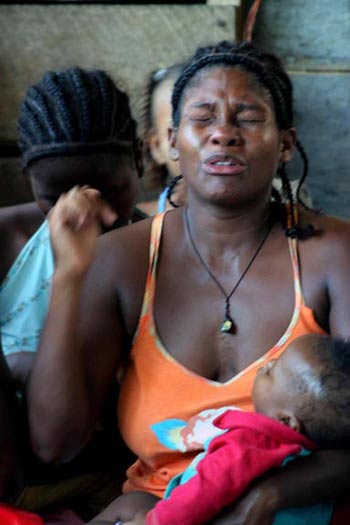 A woman cries as she recalls the murder of her family members when they were driven from their homes by paramilitaries. Today she lives in an Afro-Colombian squatter community, the Brisas de los Angeles barrio, controlled by paramilitaries as well. (Photo: David Bacon)The promises of the LAP supporters proved ephemeral, however, and attacks actually increased over the past three years. “In 2013, 26 trade unionists were murdered, four more than in 2012,” according to the AFL-CIO. “Attempted murders also increased, from seven to 13. Since the LAP was signed, there have been 31 attempted murders, six forced disappearances and nearly 1,000 death threats.” Some 86.8% of murders went unpunished, as well as 99.9% of threats against unionists, giving an overall impunity rate for human rights violations against trade unionists of 96.7%.
A woman cries as she recalls the murder of her family members when they were driven from their homes by paramilitaries. Today she lives in an Afro-Colombian squatter community, the Brisas de los Angeles barrio, controlled by paramilitaries as well. (Photo: David Bacon)The promises of the LAP supporters proved ephemeral, however, and attacks actually increased over the past three years. “In 2013, 26 trade unionists were murdered, four more than in 2012,” according to the AFL-CIO. “Attempted murders also increased, from seven to 13. Since the LAP was signed, there have been 31 attempted murders, six forced disappearances and nearly 1,000 death threats.” Some 86.8% of murders went unpunished, as well as 99.9% of threats against unionists, giving an overall impunity rate for human rights violations against trade unionists of 96.7%.
According to Brian Finnegan, global worker rights coordinator at the AFL-CIO, “the labor action plan has absolutely no element of enforcement.” The “action” in the plan this year consists of two technical-level meetings and a high-level meeting. There are no benchmarks, and no official count is even made of incidents of anti-union violence or violations of labor rights.
The LAP is condemned as totally ineffective in a recent report by Colombia’s labor federations, backed by the AFL-CIO. Tarcisio Rivera, president of the Central Unitaria de Colombia, calls the trade agreement and labor action plan “useless and detrimental for both the Colombian economy and the rights of workers.” The report, supported by a number of international labor organizations including IndustriALL Global Union-Americas, cited extensive illegal subcontracting and illegal hiring.
For longshoremen in Colombia’s largest port of Buenaventura, those numbers are more than statistics. Today, the port consists of four terminals, handling 14 million tons of cargo. One wharf even belongs to the Colombian military, which leases it to Grupo Portuario, a private company.
Jhon Jairo Castro, president of the Union Portuaria, or Dockworkers’ Union in Buenaventura, accuses companies in the port of mass firings when workers organize. “They demand that workers sign letters resigning from the union to get hired,” he charges. “A number of our members have been murdered, but the authorities ‘investigate’ and then say it has nothing to do with their union activity.”
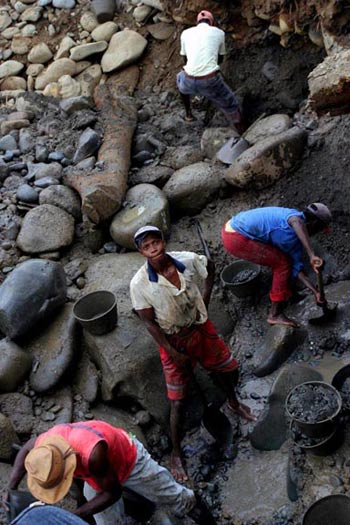 Afro-Colombian and indigenous Colombian small scale gold miners struggle to continue to live in a community on the Rio Ovejas threatened by large-scale development projects, encouraged by the free trade agreement. Development projects have brought massacres here by Colombia’s paramilitaries, who seek to push communities here off their land. (Photo: David Bacon)The result is a climate of fear. “Talking about the union invites being fired. We call it labor terrorism. There is absolutely no guarantee of your right to union activity.”
Afro-Colombian and indigenous Colombian small scale gold miners struggle to continue to live in a community on the Rio Ovejas threatened by large-scale development projects, encouraged by the free trade agreement. Development projects have brought massacres here by Colombia’s paramilitaries, who seek to push communities here off their land. (Photo: David Bacon)The result is a climate of fear. “Talking about the union invites being fired. We call it labor terrorism. There is absolutely no guarantee of your right to union activity.”
Only a minority of the port’s 6000 workers, therefore, belong to the union. “We survive because of solidarity, from our own members and from other organizations,” Castro explains. “We have the right on paper to negotiate with the employers, but it’s another thing to be able to exercise it. In 2012, we had a strike at TECSA and started negotiations. The company filed a suit against our union, demanding that all our members be fired and our union dissolved. The government backs them with the police and laws that violate our rights, like the decree that anyone blocking the street during demonstrations would be imprisoned.”
According to Neil Martin of the Project for International Accompaniment and Support in Colombia (PASO), which organizes support for the Union Portuaria, “The union’s strategy is to organize these subcontracted workers into a low profile Workers Committee until a majority is willing to go on strike. Other strategies include building city-wide coalitions between unions and grassroots community organizations around broader social issues in Buenaventura, and increased involvement in international networks.”
The conditions of Buenaventura’s longshore workers, and the harsh reprisals against them for trying to form unions, dramatically illustrate the failure of Colombia’s Labor Action Plan.
The conditions of Buenaventura’s longshore workers, and the harsh reprisals against them for trying to form unions, dramatically illustrate the failure of Colombia’s Labor Action Plan. According to Castro, “the national government is responsible for this system, because it privatized the ports and didn’t implement any regulations or labor standards covering employment.”
Labor contractors on the docks in Buenaventura pay $200 for two weeks work loading and unloading ships. But they don’t pay cash. On payday, longshoremen have to go to a loan shark, and borrow against the promise of a paycheck, but for considerably less – $170 or $180. “They have to sell the pay from the contractor,” charges Castro.
 Afro-Colombians displaced by large-scale development projects on their way to work near Cali. (Photo: David Bacon)
Afro-Colombians displaced by large-scale development projects on their way to work near Cali. (Photo: David Bacon)
To get that pay, they have to work far longer than the government-mandated maximum workweek of 48 hours. Some labor eight hours on, then get eight hours off, and then return for another eight hours. Others work “the devil’s shift” – kept on the docks for 24 or even 36 hours, but paid for eight only. “Everyone is hired on a daily basis, and gets paid by the hour, with no daily guarantee,” Castro says.
In 1994, the Colombian Port Authority was privatized and replaced by the privately-run Regional Port Society of Buenaventura. A second private company, TECSA, S.A, runs Port operations under contract. TECSA then brings in an “intermediary,” which hires a temporary employment agency. The agency uses a labor contractor, who has no office and simply stands on the street, hiring longshoremen. The contractor has no financial resources for meeting a payroll, thus forcing workers to wait weeks to get paid, or to sell the promise of a paycheck.
“People cannot earn enough to support themselves,” Castro says. “We have port workers who are actively working who make only 200 dollars a month. We have workers who have to beg in the streets, who sleep on the sidewalks. Even after working 20 years, they have no social security and no pensions.”
Buenaventura’s 370,000 inhabitants are mostly Afro-Colombian – people descended from slaves brought from Africa during the centuries when Colombia was a Spanish colony. Over 80% of its people live in poverty, and a third are unemployed, four times the national average. Two thirds of Buenaventura homes have no sewer connection, and almost half have no drinking water. Life expectancy here is 51, while nationally it is 62.
“Poverty causes the disintegration of families,” Castro says. “Our children are recruited as prostitutes, or into criminal gangs and illegal armed groups.”
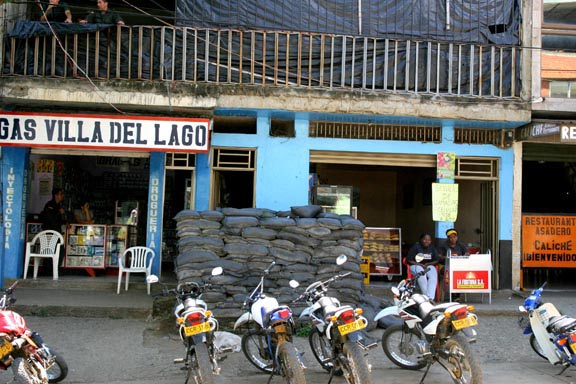 The Colombian military maintains an armed fort, called a “trincheras,” in the middle of Suarez, in an Afro-Colombian area of Valle de Cauca. The army was accused of assassinating local activists in order to force them to leave. (Photo: David Bacon)
The Colombian military maintains an armed fort, called a “trincheras,” in the middle of Suarez, in an Afro-Colombian area of Valle de Cauca. The army was accused of assassinating local activists in order to force them to leave. (Photo: David Bacon)
Other workers and unions in Colombia also share the problems faced by the Union Portuaria. But in Buenaventura, the union says it is also targeted because of discrimination against Afro-Colombians. Employers, it says, bring people from the interior and give them better jobs than the ones available to Buenaventura residents. “In the Afro-Colombian community, work and pay is lowest and most unequal,” Castro says. “The cane cutters. The longshoremen. Those who work in the African palms.”
Of Colombia’s 44 million people, 49.2% live below the poverty line. But poverty is not evenly distributed. The country’s health care system, damaged by budget cuts to fund the government’s counterinsurgency war, covers 40% of white Colombians. Only 10% of black Colombians get health services. A mere 3% of Afro-Colombian workers receive social security benefits.
Institutionalized inequality is reinforced by internal displacement. From 1940 to 1990, Colombia’s urban population grew from 31% to 77%, as people fled rural poverty and decades of civil war. But by 2009, Colombia’s Constitutional Court found the fundamental rights of displaced Afro-Colombians were “massively and continuously ignored,” citing Buenaventura as a symbol of inequality.
Human Rights Watch’s 2014 report, “The Crisis in Buenaventura,” says “for the past three years, Buenaventura has led all Colombian municipalities in the numbers of newly displaced persons.” It counted 22,028 residents who fled in 2011, 15,191 in 2012, and 13,468 between January and October 2013.
“Since almost 99% of displaced people are Afro-Colombians, privatization and displacement have a racist component.”
According to Castro, in the last decade, 60,000 people have been forced out. “Now the latest plans for expanding the port will affect another five to ten thousand. Since almost 99% of displaced people are Afro-Colombians, privatization and displacement have a racist component.”
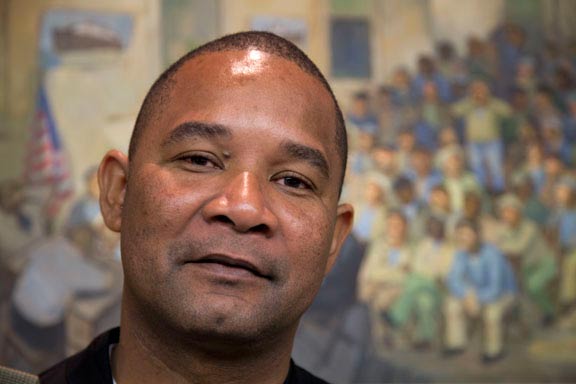 Jhon Jairo Castro, president of the Union Portuaria, or Longshore Union, in Buenaventura, Colombia. (Photo: David Bacon)
Jhon Jairo Castro, president of the Union Portuaria, or Longshore Union, in Buenaventura, Colombia. (Photo: David Bacon)
Human Rights Watch charges that violence drives displacement. At its height the right wing paramilitary organization, the United Self Defense Forces (AUC), killed more than 1000 Buenaventurans in 2000 and 2001 alone, according to prosecutors. After the AUC was “demobilized” in December of 2004, other right-wing paramilitary groups emerged – incorporating former AUC members.
Many corpses are dismembered, washed up on the beaches after being cut apart in “chop up houses.”
People are “disappeared” every year – 24 in 2006, 63 in 2008, 43 in 2010 and 38 in 2013, the report states. Many corpses are dismembered, washed up on the beaches after being cut apart in “chop up houses.”
Paramilitaries require permits to hold gatherings, enforce curfews and prohibit visitors in the areas they control. They cooperate with local businessmen. After water was privatized several years ago, service was cut to two-three hours a day, while rates went up. When protesting residents refused to pay, company representatives showed up at their homes with men carrying machine guns. “In Bajamar,” HRW says “for the first three days of November, there were shootouts three or four times a day, lasting up to two hours. On the third day, the Urabeños removed a man from a house and executed him in front of community members.”
Despite repression and extreme violence, however, the longshore union in Buenaventura continues to exist. It participates actively in labor resistance to Colombia’s free-trade policies. “We admire the people who can stand up to pressure from the companies and the port association,” Castro says. The union organized two strikes last year and won contracts, although several workers were beaten and thirty were fired.”
“Today we see more unity in our community, like the recent strike in the countryside which led to a strike among longshore workers and students. With this kind of mobilization we will be able to stop the policies that are hurting us, and change Colombian society.”
Copyright, David Bacon
 Afro-Colombian dancers in Tumaco. (Photo: David Bacon)
Afro-Colombian dancers in Tumaco. (Photo: David Bacon)
Speaking against the authoritarian crackdown
In the midst of a nationwide attack on civil liberties, Truthout urgently needs your help.
Journalism is a critical tool in the fight against Trump and his extremist agenda. The right wing knows this — that’s why they’ve taken over many legacy media publications.
But we won’t let truth be replaced by propaganda. As the Trump administration works to silence dissent, please support nonprofit independent journalism. Truthout is almost entirely funded by individual giving, so a one-time or monthly donation goes a long way. Click below to sustain our work.